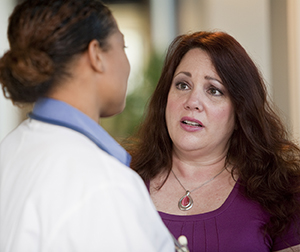Understanding Borderline Personality Disorder (BPD)
Borderline personality disorder (BPD) is a serious medical illness. It can make close relationships difficult to maintain, and it may cause the affected person and their loved ones great pain. But BPD can be treated, and the symptoms can be eased. If a loved one has signs of BPD, start by talking to your healthcare provider or a mental health professional. Either one can offer guidance and support.

What is BPD?
People with BPD want to be loved, yet they push others away. The relationships they do have are stormy. People with BPD can fly into rages for no apparent reason. Sometimes they just feel the need to lash out. At other times, they may feel out of touch with life. And the way they see themselves may change often. Their values, beliefs, and goals also may change.
Who does it affect?
The cause of BPD isn’t fully known. Many factors most likely play a role. Some people with borderline personality disorder may have been abused as children. Others may have suffered trauma, neglect, or been abandoned. And some may have serious head injuries. BPD may also be tied to certain genes. It seems to run in families.
Getting better
Counseling (psychotherapy) is the main treatment for BPD. Working with a therapist, a person with BPD can learn how best to cope with problems. They can also learn ways to control their feelings. Medicines can help control specific symptoms associated with depression and anxiety. Still, it may take a while before symptoms get better. But don’t lose hope. In time, your loved one can have a more healthy and happy life.
How daily issues affect your health
Many things in your daily life impact your health. This can include transportation, money problems, housing, access to food, and child care. If you can’t get to medical appointments, you may not receive the care you need. When money is tight, it may be difficult to pay for medicines. And living far from a grocery store can make it hard to buy healthy food.
If you have concerns in any of these or other areas, talk with your healthcare team. They may know of local resources to assist you. Or they may have a staff person who can help.
Someone with BPD will have at least 5 of these symptoms:
-
Intense fears of being left alone and frantic efforts to avoid it
-
A pattern of stormy relationships
-
A self-image that changes often
-
Actions that cause harm, such as using drugs or alcohol
-
Wide mood swings
-
Intense anger or outbursts
-
Feelings of being out of touch with life
-
Thoughts of harming themselves or committing suicide
-
Chronic feelings of emptiness
Online Medical Reviewer:
L Renee Watson MSN RN
Online Medical Reviewer:
Marianne Fraser MSN RN
Online Medical Reviewer:
Paul Ballas MD
Date Last Reviewed:
5/1/2022
© 2000-2025 The StayWell Company, LLC. All rights reserved. This information is not intended as a substitute for professional medical care. Always follow your healthcare professional's instructions.